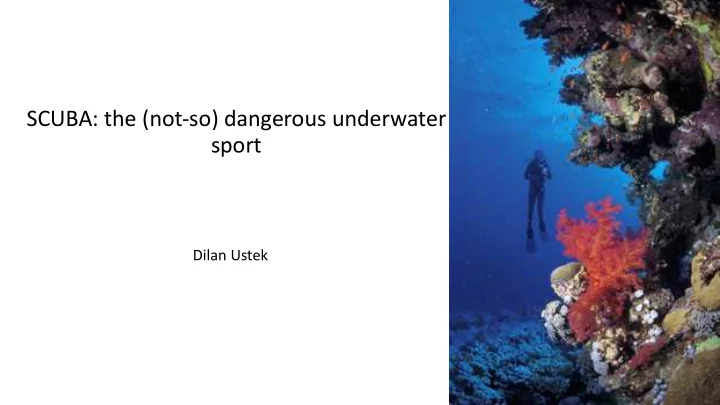

SCUBA: the (not-so) dangerous underwater sport Dilan Ustek
The what • SCUBA = Self-Contained Underwater Breathing Apparatus • Snorkeling != SCUBA • Free diving != SCUBA
SCUBA
Snorkeling
SCUBA
Free diving
SCUBA
The how - How to float with that giant Tank - How to submerse in water with that giant suit of air - Buoyancy – Your lungs are air bags! - Decompression times - Ear pressure balancing - Land vs. ship - Walking in the fins and gear
The feeling • Before water • Sounds underwater • Sight • Temperature • Communication • Afterwards
The safety! • The bends result when dissolved gases (mostly nitrogen) absorbed as air is breathed under pressure are released as gas back into the bloodstream. • Embolism results when gases in the lung expand during ascent and rupture lung tissue, causing air bubbles to enter the bloodstream. • These conditions can happen if a diver ascends too quickly. • Dive computers • Divers use enriched air (nitrox) which has a higher percentage of oxygen than air, but with a lower risk of oxygen toxicity.
The physics • Ideal Gas Law: PV = nRT • Air in a scuba tank is pressurized to about 3000 psi.
Dive table
The where • UBC Aquatics Club • Diving Locker • International Diving Center Equipment Need to rent equipment, and pay for the trip/courses ~ 60 CAD for wetsuits, BCD, tank, regulators, weight belt
Certifications
Safety Quiz • How much pressure increase(in atm.) for every 10m descend? • Is it safe to dive after taking blood thinners? • Is it safe to climb a mountain and then go diving? Vice versa? • Is it ok to hold your breath while diving? • Is diving safe?
I’d like to be under the sea
Recommend
More recommend